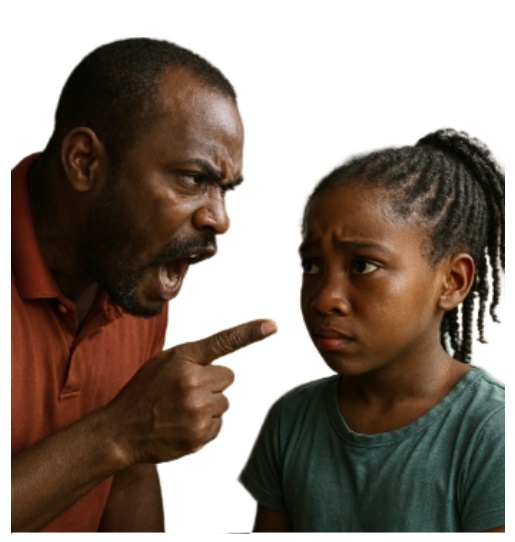Verbal Abuse in Childhood Worsens Mental Wellbeing Than Physical Abuse, Study finds
By Adebowale Bello. B.Tech Microbiology, Freelance Health Writer. Medically reviewed by the DLHA team.

Angry African father shouting at his tearful young daughter. Image Credit: Microsoft Copilot AI
Tope came home from school with her test results on a hot Tuesday afternoon. The 10-year-old girl had scored below average in mathematics. Instead of encouragement, she was met with sharp words from her father: “You will never amount to anything if you keep failing like this!”
Tope did not cry but she carried those words quietly in her heart. Years later, as a young woman, she still remembered them more than the beating she sometimes got for coming home late. The slap marks faded but her father’s words lived on, shaping how she saw herself and how much she believed in her own abilities.
When we talk about child abuse, most people think of hitting, beating or other physical harm yet words can also cut deep and leave lasting scars.
Many African homes believe that “it is just talk” or “children will forget” when harsh words are used but new research shows that verbal abuse can be just as harmful as physical abuse, if not worse. Understanding this is important for African parents, guardians and communities because what we say to children today can affect their mental health for the rest of their lives.
Researchers from England and Wales analysed data from more than 20,000 adults across several surveys carried out between 2012 and 2024. They asked participants about their childhood experiences of abuse and linked these to their current mental wellbeing. The study looked specifically at two types of abuse:
The mental health of participants was measured using a well-known scale that assesses feelings of happiness, usefulness, closeness to others and general wellbeing.
What the Study Found
The study also showed that exposure to physical abuse has reduced in recent generations.
On the other hand, verbal abuse has been increasing.
When looking at specific aspects of wellbeing, the study found that people who were verbally abused as children were more likely to say they never or rarely felt close to others.
What the Study Means to Africans
For many African families, raising a child often comes with strict discipline and the use of harsh words. Phrases like “you are useless” or “you will never succeed” are sadly common. While physical punishment has long been debated and in some countries reduced, verbal abuse often goes unnoticed because it is seen as normal parenting.
This study makes it clear that words can wound children deeply and the effects may not disappear even when they grow up. Poor mental wellbeing is linked with depression, anxiety, difficulty forming healthy relationships and even lower productivity at work. For African societies where mental health is often not given enough attention, this research is a wake-up call.
Related: Why do so many African youths have social anxiety disorder?
It also means that our efforts to reduce child abuse must go beyond stopping physical punishment. We need to rethink the way we talk to children and move away from constant shouting and insults. Children who grow up in supportive and encouraging environments are more likely to become confident, resilient and mentally healthy adults.
In African culture, proverbs and sayings are powerful and often used to guide children. But sometimes these words can be discouraging or shaming. Communities and schools need to be part of the solution by promoting positive discipline and teaching parents about the long-term impact of verbal abuse. Religious leaders, teachers and community heads can play a role in spreading awareness that words also hurt and that speaking encouraging words is not a sign of weakness but a way to build stronger generations.
Governments and health bodies should also include verbal abuse in child protection policies and mental health programmes. Just as campaigns have reduced the acceptance of physical beating, similar campaigns can help parents understand that shouting and constant criticism harm children more than they imagine.
The message from this study is simple but powerful: verbal abuse is not harmless. It leaves marks that are just as damaging as physical abuse and can follow children into adulthood. While physical abuse may be reducing in some parts of the world, verbal abuse is quietly rising. For Africans, this is the time to pause and reflect on how we discipline and guide our children. By choosing kinder words and replacing insults with encouragement, we can raise a generation that is not only physically strong but also mentally healthy.
Source: Bellis MA, Hughes K, Ford K, et al. Comparative relationships between physical and verbal abuse of children, life course mental well-being and trends in exposure: a multi-study secondary analysis of cross-sectional surveys in England and Wales. BMJ Open 2025. Available from here.
Published: September 10, 2025
© 2025. Datelinehealth Africa Inc. All rights reserved.
Permission is given to copy, use and share content for non-commercial purposes without alteration or modification and subject to source attribution.
DATELINEHEALTH AFRICA INC., is a digital publisher for informational and educational purposes and does not offer personal medical care and advice. If you have a medical problem needing routine or emergency attention, call your doctor or local emergency services immediately, or visit the nearest emergency room or the nearest hospital. You should consult your professional healthcare provider before starting any nutrition, diet, exercise, fitness, medical or wellness program mentioned or referenced in the DatelinehealthAfrica website. Click here for more disclaimer notice.